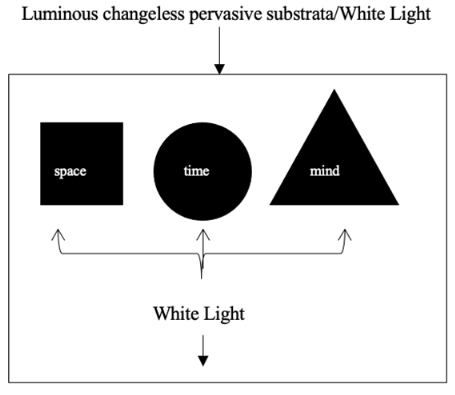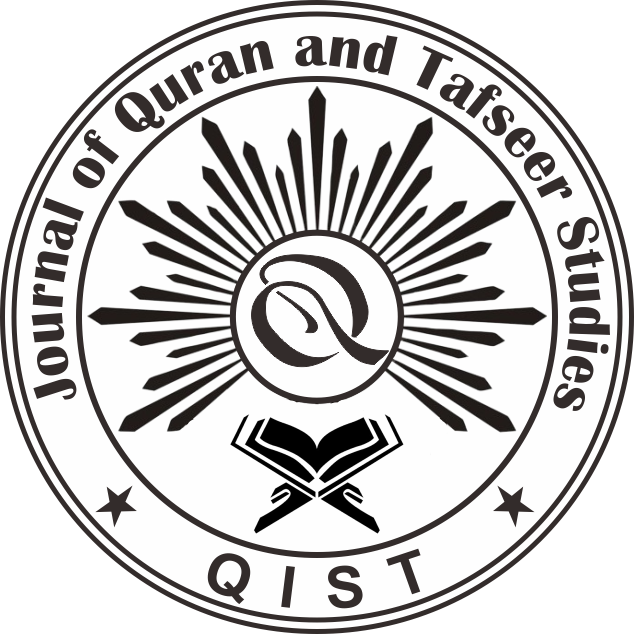EXPLORING CONSCIOUSNESS THROUGH THE QUR'AN: A PHILOSOPHICAL INQUIRY
DOI:
https://doi.org/10.23917/qist.v3i2.4525Keywords:
Quran tafsir, Islam, Theology, Consciousness, EnlightenmentAbstract
This paper delves into the concept of consciousness as explored through the Qur'an, presenting a comprehensive philosophical inquiry into Islamic perspectives on the mind, self-awareness, and the nature of human understanding. Employing a hermeneutic approach to interpret Qur'anic verses, the study highlights the unique contributions of Islamic thought to the global discourse on consciousness. By juxtaposing Qur'anic teachings with contemporary philosophical and scientific theories of consciousness, this inquiry sheds light on the interplay between divine wisdom and human intellect in understanding the essence of consciousness. The research adopts a multidisciplinary methodology, integrating insights from Islamic theology, philosophy, psychology, and cognitive science to explore the Qur'anic conceptualization of consciousness. The analysis reveals that the Qur'an offers profound insights into the nature of consciousness, emphasizing its multifaceted dimensions, including self-awareness, perception, intentionality, and the soul's journey. Furthermore, the paper discusses the implications of the Qur'anic perspective on consciousness for ethical behavior, personal identity, and the pursuit of knowledge. It argues that the Qur'an advocates for a holistic understanding of consciousness that encompasses both physical and spiritual dimensions, encouraging a harmonious balance between material and transcendental aspects of human existence. The study concludes that exploring consciousness through the Qur'an enriches the philosophical inquiry into the nature of the mind and provides valuable ethical and spiritual insights. This interdisciplinary exploration contributes to bridging the gap between religious wisdom and contemporary scientific understanding, offering a nuanced perspective on one of human existence's most profound and complex phenomena.
References
Abdussalam, A, T Supriyadi, U Supriadi, A Saepudin, and M I Pamungkas. "Exegetical Translation of the Qur'an: An Action Research on Prospective Islamic Teachers in Indonesia." Indonesian Journal of Applied Linguistics 11, no. 2 (2021): 254–68. https://doi.org/10.17509/ijal.v11i2.34691.
Abulmajd, Abdurrahman. "QUR'ANIC STUDIES IN CONFRONTING ORIENTALIST CONFLICTS STUDYING THE QUR'ANIC TREATMENT IN THE STORY OF ABRAHAM (PEACE BE UPON HIM) TO REFUTE SOME ORIENTALIST ALLEGATIONS." QiST: Journal of Quran and Tafseer Studies 2, no. 2 (March 14, 2023): 134–62. https://doi.org/10.23917/qist.v2i2.1708.
Alhaj, Ali Albashir Mohammed. "TRANSLATING AYAHS ALEUDUL العدول IN THE QURANIC CONTEXTS: AN INTERDISCIPLINARY JURISPRUDENTIAL LINGUISTIC STUDY." QiST: Journal of Quran and Tafseer Studies 3, no. 2 (March 18, 2024): 171–91. https://doi.org/10.23917/qist.v3i2.3542.
Ally, S. "Opposition to Word-Breaking in the Practice of Qur'an Commentary in Eighth/Fourteenth- and Ninth/Fifteenth-Century Mamlūk Cairo." Journal of Qur'anic Studies 25, no. 1 (2023): 1–35. https://doi.org/10.3366/jqs.2023.0528.
Djalal, Zaglul Fitrian. "TAFSIR PASE: (TELAAH ATAS METODOLOGI TAFSIR ACEH)." QiST: Journal of Quran and Tafseer Studies 1, no. 1 (February 17, 2022): 92–104. https://doi.org/10.23917/qist.v1i1.527.
Ghadimi, R, M Kamrani, A Zarghami, and A Darzi. "The Role of Nutrition in Educational and Spiritual Development of Human Beings: Quranic Perspective." Journal of Babol University of Medical Sciences 15, no. SUPPL.1 (2013): 34–39.
Hameed, A A. "The Methodology of Tafsir Al-Mubsir Li-Nur Al-Quran: The Only Complete Exegesis Written by a Woman (Naila Hashim Sabri)." AlBayan 14, no. 1 (2016): 30–50. https://doi.org/10.1163/22321969-12340030.
Hashim, A, N I Ani, M M A Rahim, and M Huda. "Investigating Effective Teaching Strategy for Tafseer of Quran: An Empirical Study." Journal of Critical Reviews 7, no. 2 (2020): 712–17. https://doi.org/10.31838/jcr.07.02.131.
Hidayat, Syamsul. "The Qoranic View of the World's Religions Study of the Indonesia Ministry of Religious Affairs' Al-Quran Dan Tafsirnya and M. Quraish Shihab's Tafsir Al-Mishbâh." Revista de Gestão Social e Ambiental 17, no. 5 (June 2023): e03534. https://doi.org/10.24857/rgsa.v17n5-010.
Iqbal, R, M Azrifah Azmi Murad, and A Ashraf. "Quantitative Assessment of Concept Maps for Conceptualizing Domain Ontologies: A Case of Quran." Pertanika Journal of Science and Technology 28, no. 1 (2020): 179–92.
Ismail, Faisal Bin Husen, S Sabirin, Wan Ainaa Mardhiah Bin Wan Zahari, Kana Safrina Rouzi, and Arwansyah Bin Kirin. "THE PRACTICE OF READING AL-QUR'AN AMONG ISLAM YOUTHS." QiST: Journal of Quran and Tafseer Studies 1, no. 2 (August 8, 2022): 105–27. https://doi.org/10.23917/qist.v1i2.1062.
KOCA, Ferhat. "Musa Carullah Bigiyef ve İslam Kongreleri (1926-1931)." Hitit İlahiyat Dergisi 21, no. 1 (June 2022): 33–80. https://doi.org/10.14395/hid.1074248.
Limbong, Rahmat IR., Agus Firdaus Chandra, Lukmanul Hakim, and Maher bin Ghazali. "A FAIR LEADER PERSPECTIVE BUYA HAMKA (REVIEW OF THE WORD 'ULIL AMRI IN SURAH AN NISA: 59)." QiST: Journal of Quran and Tafseer Studies 2, no. 2 (April 26, 2023): 220–37. https://doi.org/10.23917/qist.v2i2.1308.
Milsih, Ira Saputra, Widia Fitri, and Mowafg Abrahem Masuwd. "THE TERM AL-HADID IN CLASSICAL AND CONTEMPORARY INTERPRETATION (COMPARATIVE STUDY OF THE QUR'AN & ITS TAFSEER AND TAFSIR MAFATIH AL GHAIB)." QiST: Journal of Quran and Tafseer Studies 1, no. 3 (December 19, 2022): 343–79. https://doi.org/10.23917/qist.v1i3.2058.
Mokrani, Adnane. "Religions in Al-Ḥarāllī's Sufi Hermeneutics: An Apolemical Understanding of the Qur'ān." Religions 14, no. 11 (November 2023): 1381. https://doi.org/10.3390/rel14111381.
Nirwana, Andri. "DA'WAH IN THE QUR'AN (THEMATIC TAFSIR)." Jurnal At-Tibyan: Jurnal Ilmu Alqur'an Dan Tafsir 4, no. 2 (December 16, 2019): 307–29. https://doi.org/10.32505/at-tibyan.v4i2.1350.
Nirwana, Andri, Syamsul Hidayat, Hayati Hayati, Furqan Furqan, Fahmi Arfan, and Susi Fitria. "SOSIALISASI DAN KONSOLIDASI PROGRAM REMAJA MASJID /REMAS TERHADAP TRANSFORMASI AKHLAK REMAJA." MONSU'ANI TANO Jurnal Pengabdian Masyarakat 3, no. 1 (June 8, 2020). https://doi.org/10.32529/tano.v3i1.480.
Nirwana, Andri, Syamsul Hidayat, and Suharjianto Suharjianto. "أصول التفسير وقواعده عند تفسير عبد الله بن عباس." Jurnal Online Studi Al-Qur'an 16, no. 2 (July 30, 2020): 137–64. https://doi.org/10.21009/JSQ.016.2.02.
Nirwana, Andri, Ita Purnama Sari, Suharjianto Suharjianto, and Syamsul Hidayat. "Kajian Kritik Pada Bentuk Dan Pengaruh Positif Al-Dakhil Dalam Tafsir Jalalain Tentang Kisah Nabi Musa Dan Khidir." AL QUDS : Jurnal Studi Alquran Dan Hadis 5, no. 2 (November 2, 2021): 717. https://doi.org/10.29240/alquds.v5i2.2774.
Nurani, Shinta, Luthfi Maulana, and Anidah Robani. "QUR'ANIC RECEPTION THROUGH NUZULUL QUR'AN COMMEMORATION TRADITION AS A SYMBOL OF COMMUNITY UNIFYING IDENTITY." QiST: Journal of Quran and Tafseer Studies 1, no. 3 (December 19, 2022): 277–89. https://doi.org/10.23917/qist.v1i3.2233.
Nurfauziah, Anisa, Eni Zulaiha, and Nazar Fadli. "THE CAUSES OF PROS AND CONS IN DIVIDING INHERITANCE TWO TO ONE BY USING THE PERSPECTIVE OF JUSTICE PRINCIPLE TAFSEER." QiST: Journal of Quran and Tafseer Studies 2, no. 1 (February 2, 2023): 88–101. https://doi.org/10.23917/qist.v2i1.1299.
Rejali, Azam, and Sayyed Hossain Vaezi. "Education and Conduct Based on Holy Quran's Approach." Mediterranean Journal of Social Sciences 5, no. 20 (2014): 1277–84. https://doi.org/10.5901/mjss.2014.v5n20p1277.
Rohman, Abdul, Ghazi Abdullah Muttaqien, Faisal Hamad ALMonawer, Tigran Rumanian, and Mohammad Deik. "CHALLENGING THE INTERPRETATION OF THE VERSE ON HIJAB BY M. QURAISH SHIHAB: A CRITICAL ANALYSIS REVIEW." QiST: Journal of Quran and Tafseer Studies 3, no. 2 (March 20, 2024): 192–215. https://doi.org/10.23917/qist.v3i2.4046.
Sweta, Andri Arungga, Muhammad Hamzah Syubly bin Abd Hadi Kamil, Aman Ullah, and Nematullo Mukhamedov. "THE URGENCY OF SIYAQ (INTERPTRETATION OF THE WORD AL-INS AND BASYAR PERSPECTIVE OF AR-RAGHIB AL-ASHFAHANI) IN KITAB AL-MUFRODAT FI GHARIB AL-QUR'AN." QiST: Journal of Quran and Tafseer Studies 1, no. 3 (December 19, 2022): 329–42. https://doi.org/10.23917/qist.v1i3.2221.
Tarman, Al Faiz Muhammad Rabbany, Arifah Cahyo Andini Suparmun, and Isral Naska. "PROGRESSIVE INTERPRETATION OF THE QUR'AN IN TAFSIR AT-TANWIR: MUHAMMADIYAH'S COLLECTIVE IDENTITY ON ENVIRONMENTAL ISSUES." QiST: Journal of Quran and Tafseer Studies 3, no. 2 (March 15, 2024). https://doi.org/10.23917/qist.v3i2.3717.
Wahid, Abd., Dewi Putri Erdina, and M Mahmudulhassan. "STUDY OF THE PRACTICE OF READING SURAH AL-ISRA VERSES 79-82 AT DUHA TIME AT HIDAYATUL ISLAMIYAH PESANTREN." QiST: Journal of Quran and Tafseer Studies 1, no. 3 (December 19, 2022): 290–306. https://doi.org/10.23917/qist.v1i3.2766.
Wahid, Abd., Mazlan Ibrahim, Bukhori Abdul Shomad, Andri Nirwana AN, and Damanhuri Damanhuri. "UTILIZING ZUHD HADITHS FOR UPPER-CLASS CRIME PREVENTION." Jurnal Ilmiah Islam Futura 23, no. 2 (August 4, 2023): 263. https://doi.org/10.22373/jiif.v23i2.17353.
Yuhanida, Yuyun, Zahro Nur Amalia, K Kerwanto, Rizwanur Rahman, Muhammad Yusril Muna, and Rahim Sabour. "EPISTEMOLOGY OF SUFISM IN SUFI INTERPRETATION (ANALYSIS OF THE PATTERNS OF THEORETICAL (NAZHARI) AND PRACTICAL ('AMALI) SUFI EXEGESIS)." QiST: Journal of Quran and Tafseer Studies 3, no. 2 (March 20, 2024): 216–33. https://doi.org/10.23917/qist.v3i2.4199.
'Abd al-'Alī Bazārgān, Hurūf al-Maqta' www.masnavi.net

Downloads
Submitted
Accepted
Published
How to Cite
Issue
Section
License
Copyright (c) 2024 Sarwar Haidari

This work is licensed under a Creative Commons Attribution 4.0 International License.














